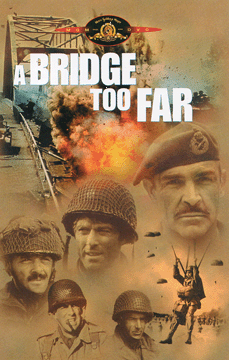Filmmakers generally don't like to make movies about losing a battle, even though in almost every other genre, having the heroes lose isn't such a taboo. This is especially ironic since the wars that are generally the subject of these movies have situations that lend themselves to the cliche of losing the battle but winning the war. It is also interesting to note that watching failure in a war movie is usually more compelling than achieving victory (if all other factors are equal mind you).
Now, you may be wondering what I am getting at with all this. Well, today is the 62nd anniversary of the commencement of Operation Market Garden, the nine-day offensive to try to seize the key bridges along a narrow front to allow the Allies to invade largely undefended Northern Germany in the fall of 1944, and I am reminded of one of the few movies I've seen that deals with a tactical and strategic failure on such a grand scale.
 That movie is A Bridge Too Far.
That movie is A Bridge Too Far.Featuring a star-studded cast, including Anthony Hopkins, Sean Connery, James Caan, Elliot Gould, Gene Hackman, Michael Caine, Laurence Olivier and Maximilian Schell, the movie recounts the tale of Operation Market Garden from inception to disastrous conclusion. I don't know if it is 100% accurate, but it is just one of those movies that allows you to see how numerous factors working together can lead to defeat for even the most competent and powerful of military forces.
I am not going to recount the battle for you all, as the Wikipedia entry does a far better job than I could in this limited space, though I do find it interesting that the aim of the operation was to end the war by Christmas 1944, and as it happened, that time period happened to coincide with the Ardennes Offensive/Battle of the Bulge, which probably would not have happened if more conservative Allied operations had been performed instead of Market Garden.
I appreciate the fact that unlike a lot of other World War II movies, the German generals in A Bridge Too Far are portrayed in a more realistic light and not as interchangeable, foaming at the mouth Nazis. There were shades of grey, and each presented figure brings something to bear on the battle. Maximilian Schell's portrayal of General Bittrich in particular stands out in my mind.
It is also refreshing to watch a movie that was epic and sweeping before the age of CGI. Back in 1977, Richard Attenborough had to use real vehicles and skillful reproductions to recreate the fighting by both the isolated elements the Allied paratroopers at Arnhem (the bridge too far) and at various points along the single highway thrust towards that final objective across the Rhine. That attention to detail isn't lost on me, and I think more present-day filmmakers could learn a thing or two from that sort of dedication. The only thing I can't comment on really is Liv Ullman's and Laurence Olivier's command of Dutch or their accent while speaking it, as they are the only two actors in the movie that are burdened with the tricky task of speaking a language that isn't their native tongue.
I will note that the movie is almost 3 hours long, so A Bridge Too Far may be something you have to block out time to see, but it is well worth the investment. The casting, directorial vision of Attenborough and the script by William Goldman came together to create an excellent and realistic war movie. So, why not check it out?
Tags:
No comments:
Post a Comment